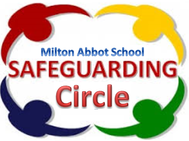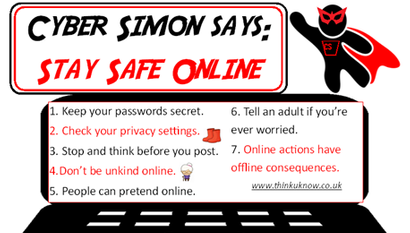|
|
Our Safeguarding Signposts: E-Safety, Child Sex Exploitation and Domestic AbuseWe hope you will find the information you are looking for, along with some useful links to external agencies who can offer you expert help, support and guidance for a wide range of concerns and issues. Although we present this information on this page to be helpful, there should be no mistake that this does not replace contacting the Milton Abbot School safeguarding team on 01822 870273 or [email protected] if you have any concerns. We say: Don't leave safeguarding to chance. Everyone has a duty to protect our children.
Early HelpWhen a child/young person/family needs something extra, Early Help is the initial response offered by all services in contact with children, young people and families. This builds an understanding to address extra needs and prevent situations from getting more difficult for children and young people. The aim of Early Help is to build on people’s capacity and resources to manage their own dilemmas, resolve their own difficulties and prevent further problems in the future. Early Help is not a designated team it is the way that EVERYONE works together to support the needs of families.
Child Sex ExploitationWhat is Child Sexual Exploitation?
Click here to read the government definition of and guidance for CSE, which was published in February 2017. Child Sexual Exploitation (or CSE as it is sometimes referred to) is a term that explains what happens when abusers encourage children and young people under 18 into sexually exploitative situations, contexts and relationships. These often involve the young person being given things such as food, accommodation, drugs, affection, gifts of money in return for performing sexual activities. Victims will often be groomed for a period of time before physical or sexual abuse takes place. Child Sexual Exploitation is a form of child abuse, it is not a specific criminal offence but the term encompasses a range of different forms of serious criminal conduct and a number of individual offences. The sexual exploitation of a child or young person will almost certainly involve the commission of a crime, or have the potential for a crime to be committed. CSE can occur through the use of technology without the child’s immediate recognition, for example the persuasion to post or send sexual images of themselves with no immediate payment or gain. In all cases those exploiting the child or young person have power over them by virtue of their age, gender, intellect, physical strength and resources available to them. Violence, coercion and intimidation are common in child sexual exploitation cases as many perpetrators target vulnerable young people. The vulnerability is often due to economic or physical circumstances that leave the young people with few choices, however, it is important to remember any child may be targeted so it is important to help them keep safe. Some realities…. Evidence shows that CSE can and does happen in all parts of the country. CSE is not restricted to urban areas such as large towns and cities but does in fact happen in rural areas such as villages and coastal areas – just like Devon. Both perpetrators and victims are known to come from a variety of ethnic and cultural backgrounds. CSE is not a crime restricted to British Pakistani Muslim males or white British girls, despite media coverage of high profile cases. Boys and young men are also targeted as victims of CSE by perpetrators. However, they may be less likely to disclose offences or seek support, often due to stigma, prejudice or embarrassment or the fear that they will not be believed There is evidence that women can be perpetrators too. They may use different grooming methods but are known to target both boys and girls. How are children sexually exploited? Children can be sexually exploited in many different ways, to help you understand and recognise what might be going on here are a few models that you should be aware of:
Training PACE (Parents against Child Sexual Abuse) have created a free online learning module about the signs and symptoms as well as the impact of CSE. It also gives advice on what to do when you think a child might be at risk of CSE http://paceuk.info/training/keep-them-safe/ For a video to help you spot the signs, click this link: https://youtu.be/pnTYFeZNLkQ E-safety - Cyber BullyingAt school we aim to provide as much information as possible about keeping your children safe on the Internet. This is enhanced and supplemented in PSHE and computer lessons they receive in school which we hope will enable them to make the right choices and learn how to keep themselves safe. The web is a wonderful learning and social resource but as with anything children need to learn what is appropriate and safe.
The most important advice is to talk to your child and play an active part in their time online. Talk with your child about their 'life online'. Consider where your child is using the internet. Keeping computers/ipads in the main family living space will help reduce any inappropriate access. If you have any concerns then please speak to your class teacher who will refer you to the child protection officer at school if necessary. Here is a link that enables you to explore the most popular sites, apps and games that children are currently using. If you click on each of the icons it gives you details of how safe it is and what the issues and concerns are about children using them. https://www.net-aware.org.uk/networks/?order=-popularity At Milton Abbot we enjoy regular assemblies featuring Cyber Simon, who reminds us the key rules for staying safe online. For our full policy: http://www.miltonabbot.devon.sch.uk/data/uploads/485.pdf
Staying safe online: parental control software: https://www.choose.co.uk/guide/parental-control-software-for-internet-safety.html Keeping your children safe online: https://www.thinkuknow.co.uk/parents/ Tips and Advice for keeping children safe on Minecraft: https://www.nspcc.org.uk/preventing-abuse/keeping-children-safe/online-safety/minecraft-a-parents-guide/ Tips and Advice for keeping children safe on Pokemon Go: https://www.nspcc.org.uk/preventing-abuse/keeping-children-safe/online-safety/pokemon-go-parents-guide/ BullyingAt Milton Abbot School, we say NO to bullying and seek to take immediate action if any child feels a victim of bullying. We have a comprehensive anti-bullying statement and policy in our policies section (see tab above).
Every child and young person has the right to be taught in a positive learning environment where everyone has an equal opportunity to achieve socially, emotionally and academically. Unfortunately, bullying does take place both in and out of school, and parents, carers, teachers and other professionals have a duty to take action if they suspect or discover that a child is being bullied. Bullying can seriously affect your child. It doesn’t just involve physical abuse – it can include emotional and verbal abuse, racist remarks and cyberbullying. The impact of bullying can often be underestimated, it is important that as a parent or carer you can recognise the impact of bullying and recognise the signs. Bullying includes:
Recognising the signs:
Finding out that your child is being bullied can be a very stressful and distressing experience. If you suspect or discover your own child or a child you know is being bullied talk to his/her Teacher or the Head Teacher. Please view our Anti-Bullying Policy here. If you are concerned about someone else’s child, talk to the parents or carers. You can access more help and advice from The Anti Bullying Network or Bullying UK Harmful Behaviour in ChildrenChildren can display harmful behaviours to themselves and others around them. If you are worried about a child that is displaying harmful behaviours, it may be for a variety of reasons. Call 0345 155 1071 if you have a concern.
Prevent - Anti-RadicalisationPrevent is part of the UK government’s counter-terrorism strategy, CONTEST. Its aim is to stop people becoming terrorists or supporting terrorism.
From 1st July, the Counter Terrorism and Security Act 2015 places a statutory duty on specified authorities to have “due regard to the need to prevent people from being drawn into terrorism”. The strategy involves thousands of people – police and intelligence officers, the emergency services, local authorities, businesses, voluntary and community organisations, governments and other partners – working in together across the UK and the world to protect the public. The strategy has four key elements:
Related documents:
Please also see our separate page on our Prevent Duty and Brilliant Britain Childline School ServicesResearch by the NSPCC has shown that the majority of children who contact ChildLine are over 11 years old. However, we know that the majority of children subject to a child protection plan are under the age of 11.
The ChildLine Schools Service will focus on primary school children from age 7 -11 years, with a particular focus on 9 -11 year olds initially. The aim is to visit every primary school in the UK at least every two years. By focusing the main objectives as outlined below, Childline aim to reach every primary school in the UK and start a societal change that will bring about a long term reduction in child cruelty. Objectives
How is this achieved? The schools programme is initially aimed at Year 5 and Year 6 pupils and consists of an assembly style presentation followed by workshops in individual classes. The materials have been developed to ensure age appropriateness and are delivered with respect and sensitivity for the children. Accompanying materials are also provided to reinforce learning. The assembly style presentation to the whole year group(s) lasts for approximately 30 minutes and aims to provide the following:
After the visit, pupils are provided with an activities booklet containing a crossword, word search and acrostic activities which reinforce the key messages from the presentation. The workshop is delivered to individual classes approximately 1 to 2 weeks after the presentation and lasts for approximately one hour. The content of the workshop is as follows:
After the workshop pupils are provided with a finger flexor to reinforce learning in a fun and colourful way and with ChildLine wallet cards. For further information please contact: Colette Hudson NSPCC Schools Service Area Coordinator: Devon & Torbay Mobile: 07710147899 Email: [email protected] When to contact The MASHIf you are worried about a child or young person in Devon and want to speak to someone, or if you are a child or young person worried about your own safety please contact the MASH on 0345 1551071 or email [email protected] and give as much information as you can.
If you are a professional, you should make a MASH contact (previously a MASH enquiry). Please see the guidance on making a MASH contact. Worried About a Child? Contact MASHIf you are concerned that a child or young person is being abused please email [email protected] or call Devon: 0345 1551071 | Out of hours please: 0845 6000388 | Emergencies: 999 |
Milton Abbot Primary School
Milton Abbot School, Milton Abbot, Tavistock, Devon PL19 0PS | 01822 870273 | CONTACT US
KEY INFORMATION |
NEWS & EVENTS |
PARENTS USEFUL LINKS |
© COPYRIGHT MILTON ABBOT SCHOOL 2019. ALL RIGHTS RESERVED | Website design by brightblueC






